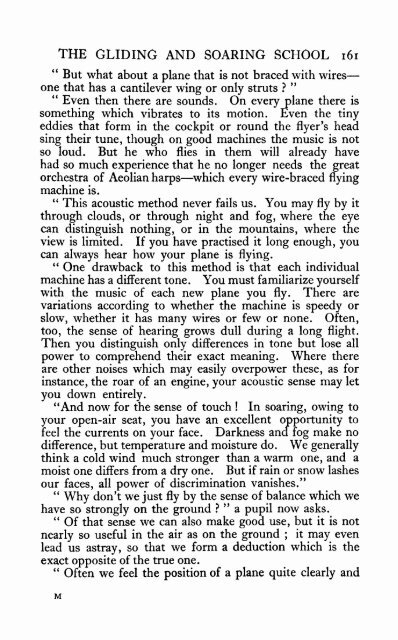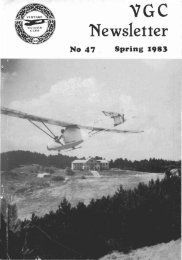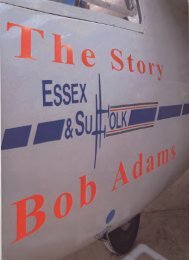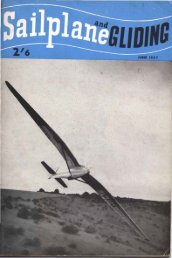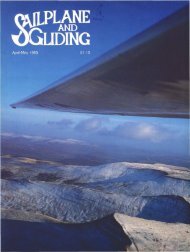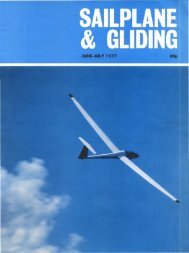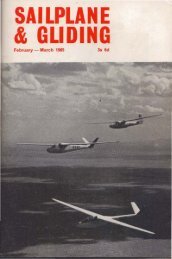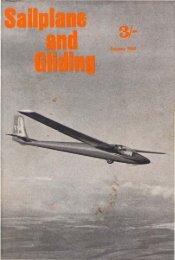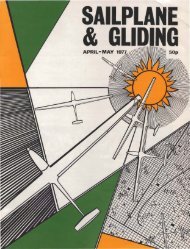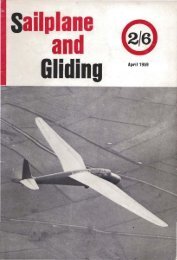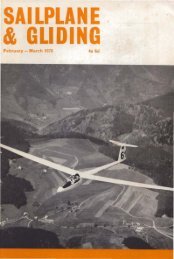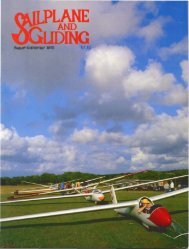- Page 2 and 3:
m X
- Page 4 and 5:
A SorvKXiu OF Tin: ATTIIOK'S VISITS
- Page 6 and 7:
Made and Printed in Great Britain b
- Page 8 and 9:
vi CONTENTS page A RECORD FLIGHT AB
- Page 10 and 11:
viii LIST OF ILLUSTRATIONS No. Plat
- Page 12 and 13:
x LIST OF ILLUSTRATIONS No. Plate f
- Page 14 and 15:
xii LIST OF DIAGRAMS CURRENTS ON HI
- Page 16 and 17:
xiv FOREWORD cross-country flight f
- Page 18 and 19:
THE STORY OF MOTORLESS HUMAN FLIGHT
- Page 20 and 21:
STORY OF MOTORLESS HUMAN FLIGHT 3 "
- Page 22 and 23:
1. AN EVENING FLIGHT OVER THE DUNES
- Page 24 and 25:
STORY OF MOTORLESS HUMAN FLIGHT 5 t
- Page 26 and 27:
STORY OF MOTORLESS HUMAN FLIGHT 7 i
- Page 28 and 29:
STORY OF MOTORLESS HUMAN FLIGHT 9 a
- Page 30 and 31:
STORY OF MOTORLESS HUMAN FLIGHT n t
- Page 32 and 33:
STORY OF MOTORLESS HUMAN FLIGHT 13
- Page 34 and 35:
STORY OF MOTORLESS HUMAN FLIGHT 15
- Page 36 and 37:
TllE "t'lIAKLOTTE," A TAILLESS SOAK
- Page 38 and 39:
THE HISTORY OF SOARING FLIGHT THE l
- Page 40 and 41:
THE HISTORY OF SOARING FLIGHT 19 mu
- Page 42 and 43:
THE HISTORY OF SOARING FLIGHT 21 A
- Page 44 and 45:
THE HISTORY OF SOARING FLIGHT 23 de
- Page 46 and 47:
TIME BRINGS THE ANSWER FEW of the t
- Page 48 and 49:
6. OTTO LILIENTHAL, THE "FATHER OF
- Page 50 and 51:
TIME BRINGS THE ANSWER 27 work in a
- Page 52 and 53:
TIME BRINGS THE ANSWER 29 a hill of
- Page 54 and 55:
TIME BRINGS THE ANSWER 31 Not only
- Page 56 and 57:
SPEEDIER PROGRESS IN the history of
- Page 58 and 59:
S. OTTO LII.IEXTIIAL'S LAST MACHINE
- Page 60 and 61:
SPEEDIER PROGRESS 35 The developmen
- Page 62 and 63:
SPEEDIER PROGRESS 37 his advanced a
- Page 64 and 65:
SPEEDIER PROGRESS 39 to perform suc
- Page 66 and 67:
THE WRIGHTS 41 The Wrights calculat
- Page 68 and 69:
THE WRIGHTS 43 the brothers made st
- Page 70 and 71:
FAMOUS CONTEMPORARIES OTHER men wer
- Page 72 and 73:
10. A VIEW OF THE WORKSHOP OF ETRU'
- Page 74 and 75:
FAMOUS CONTEMPORARIES 47 only succe
- Page 76 and 77:
FAMOUS CONTEMPORARIES 49 to unfores
- Page 78 and 79:
FAMOUS CONTEMPORARIES 51 would neve
- Page 80 and 81:
FAMOUS CONTEMPORARIES 53 he went to
- Page 82 and 83:
12. THE MACHINE BUILT BY KLEMPERER
- Page 84 and 85:
TEN YEARS OF COMPETITION & EXPERIEN
- Page 86 and 87:
TEN YEARS OF COMPETITION & EXPERIEN
- Page 88 and 89:
TEN YEARS OF COMPETITION & EXPERIEN
- Page 90 and 91:
TEN YEARS OF COMPETITION & EXPERIEN
- Page 92 and 93:
RECORDS 63 succeeded in flying to w
- Page 94 and 95:
RECORDS 65 exactly along what lines
- Page 96 and 97:
RECORDS 67 and their records. Altho
- Page 98 and 99:
RECORDS 69 This feat of endurance w
- Page 100 and 101:
15. THE " ESPENLAUB 5 " IN FLIGHT.
- Page 102 and 103:
THE LEAN YEARS 71 In the year 1923,
- Page 104 and 105:
THE LEAN YEARS 73 interesting on ac
- Page 106 and 107:
^ ?%Vif o ItiJV .J
- Page 108 and 109:
THE LEAN YEARS 75 thirteen miles, w
- Page 110 and 111:
THE LEAN YEARS 77 to be carried out
- Page 112 and 113:
ON THE WAY TO SCIENTIFIC FLYING IN
- Page 114 and 115:
flights suggested by Professor Geor
- Page 116 and 117:
19. THE FAMOUS AIRCRAFT DESKJXEK, F
- Page 118 and 119:
ON THE WAY TO SCIENTIFIC FLYING 83
- Page 120 and 121:
ON THE WAY TO SCIENTIFIC FLYING 85
- Page 122 and 123:
22. NEHRING, A VERITABLE MASTER IN
- Page 124 and 125:
ON THE WAY TO SCIENTIFIC FLYING 87
- Page 126 and 127:
ON THE WAY TO SCIENTIFIC FLYING sti
- Page 128 and 129:
OUR EFFORTS REWARDED 91 The most im
- Page 130 and 131:
OUR EFFORTS REWARDED 93 From time t
- Page 132 and 133:
','4 THE "HAPACE." A FRENCH SOAKER
- Page 134 and 135:
OUR EFFORTS REWARDED 95 of an appro
- Page 136 and 137:
THE FIRST SIXTY-MILE SOARING FLIGHT
- Page 138 and 139:
4 4 At THE AUTHOR'S HKTTRX FROM HIS
- Page 140 and 141:
FIRST SIXTY-MILE SOARING FLIGHT 99
- Page 142 and 143:
FIRST SIXTY-MILE SOARING FLIGHT 101
- Page 144 and 145:
,'30. THE " RnoxfiEisT " (SPIRIT OF
- Page 146 and 147:
FIRST SIXTY-MILE SOARING FLIGHT 103
- Page 148 and 149:
1,500 0 L-. Facing page 1U4 32. KRO
- Page 150 and 151:
FIRST SIXTY-MILE SOARING FLIGHT 105
- Page 152 and 153:
SOARING PILOTS REPORT 107 and thirt
- Page 154 and 155:
SOARING PILOTS REPORT 109 five hund
- Page 156 and 157:
SOARING PILOTS REPORT flying machin
- Page 158 and 159:
SOARING PILOTS REPORT 113 me in the
- Page 160 and 161:
SOARING PILOTS REPORT 115 at the be
- Page 162 and 163: SOARING PILOTS REPORT 117 another b
- Page 164 and 165: SOARING PILOTS REPORT 119 feet per
- Page 166 and 167: SOARING PILOTS REPORT 121 my though
- Page 168 and 169: SOARING PILOTS REPORT 123 living ar
- Page 170 and 171: SOARING PILOTS REPORT 125 want to w
- Page 172 and 173: SOARING PILOTS REPORT 127 near to u
- Page 174 and 175: SOARING PILOTS REPORT 129 three tho
- Page 176 and 177: SOME FLIGHTS OF MY OWN I MY RIDE WI
- Page 178 and 179: SOME FLIGHTS OF MY OWN 133 violentl
- Page 180 and 181: THE PILOT'S SEAT IN THE " WIEN Faci
- Page 182 and 183: SOME FLIGHTS OF MY OWN 135 Gotha. I
- Page 184 and 185: SOME FLIGHTS OF MY OWN 137 to funct
- Page 186 and 187: SOME FLIGHTS OF MY OWN 139 place. T
- Page 188 and 189: SOME FLIGHTS OF MY OWN 141 unknown
- Page 190 and 191: SOME FLIGHTS OF MY OWN 143 possibil
- Page 192 and 193: SOME FLIGHTS OF MY OWN 145 IV SOARI
- Page 194 and 195: SOME FLIGHTS OF MY OWN 147 mingling
- Page 196 and 197: THE GLIDING AND SOARING SCHOOL 149
- Page 198 and 199: NORMAL. FLI&HT! HOW TO STEER -.., F
- Page 200 and 201: THE GLIDING AND SOARING SCHOOL 151
- Page 202 and 203: THE GLIDING AND SOARING SCHOOL 153
- Page 204 and 205: HE TURNS TO THE RIGHT* HOW TO STEER
- Page 206 and 207: THE GLIDING AND SOARING SCHOOL 155
- Page 208 and 209: THE GLIDING AND SOARING SCHOOL 157
- Page 210 and 211: THE GLIDING AND SOARING SCHOOL 159
- Page 214 and 215: 44. STALLING : THE MOST DANGEROUS F
- Page 216 and 217: THE GLIDING AND SOARING SCHOOL 163
- Page 218 and 219: THE GLIDING AND SOARING SCHOOL 165
- Page 220 and 221: CLIMBING PLIGHT OP A MOTOR PLANE. T
- Page 222 and 223: THE GLIDING AND SOARING SCHOOL 167
- Page 224 and 225: ON THE WAY TO THE "B" TEST 169 " Th
- Page 226 and 227: ON THE WAY TO THE " B " TEST 171 gi
- Page 228 and 229: ON THE WAY TO THE " B " TEST 173 Th
- Page 230 and 231: ON THE WAY TO THE " B " TEST 175 yo
- Page 232 and 233: ON THE WAY TO THE " B " TEST 177 Gr
- Page 234 and 235: THE SOARING COURSE 179 " Must we pu
- Page 236 and 237: THE SOARING COURSE 181 of eight can
- Page 238 and 239: THE ORDINARY CURVE NECESSARY FOR TH
- Page 240 and 241: THE SOARING COURSE 183 nearer to it
- Page 242 and 243: THE SOARING COURSE 185 make several
- Page 244 and 245: 6O° 50. Facing page 186 AXIS OF= I
- Page 246 and 247: HIGH PERFORMANCE FLIGHTS THE flight
- Page 248 and 249: HIGH PERFORMANCE FLIGHTS 189 distan
- Page 250 and 251: HIGH PERFORMANCE FLIGHTS 191 down,
- Page 252 and 253: HIGH PERFORMANCE FLIGHTS 193 both p
- Page 254 and 255: a. KROMFHLD Facing page 1 LANDING,
- Page 256 and 257: HIGH PERFORMANCE FLIGHTS 195 lightl
- Page 258 and 259: HIGH PERFORMANCE FLIGHTS 197 accomp
- Page 260 and 261: facing page TTIE PARALLELOGRAM OF V
- Page 262 and 263:
LONG DISTANCE SOARING 199 When vari
- Page 264 and 265:
LONG DISTANCE SOARING 201 many long
- Page 266 and 267:
LONG DISTANCE SOARING 203 planned f
- Page 268 and 269:
LONG DISTANCE SOARING 205 extremely
- Page 270 and 271:
LONG DISTANCE SOARING 207 The habit
- Page 272 and 273:
LONG DISTANCE SOARING 209 Sundays.
- Page 274 and 275:
CLOUD AND THUNDERSTORM SOARING 211
- Page 276 and 277:
CLOUD AND THUNDERSTORM SOARING 213
- Page 278 and 279:
12,000 9,000 I 6,000 3,000 ATTEMPT
- Page 280 and 281:
CLOUD AND THUNDERSTORM SOARING 215
- Page 282:
6300 ,•5600 Q£JUD UPWIND SLOPE U
- Page 285 and 286:
2i8 KRONFELD ON GLIDING & SOARING F
- Page 288 and 289:
CLOUD AND THUNDERSTORM SOARING 219
- Page 290 and 291:
CLOUD AND THUNDERSTORM SOARING 221
- Page 292 and 293:
CLOUD AND THUNDERSTORM SOARING 223
- Page 294 and 295:
CLOUD AND THUNDERSTORM SOARING 225
- Page 296 and 297:
AUTO AND AEROPLANE TOWING THE metho
- Page 298 and 299:
AUTO AND AEROPLANE TOWING 229 to oc
- Page 300 and 301:
tc c t Ci c t- c r th— C/- H K" V
- Page 302 and 303:
AUTO AND AEROPLANE TOWING 231 from
- Page 304 and 305:
AUTO AND AEROPLANE TOWING 233 examp
- Page 306 and 307:
62. ESPENLAUB'S GLIDER THAT WAS TOW
- Page 308 and 309:
AUTO AND AEROPLANE TOWING 235 to th
- Page 310 and 311:
AUTO AND AEROPLANE TOWING 237 mater
- Page 312 and 313:
AUTO AND AEROPLANE TOWING 239 weigh
- Page 314 and 315:
AUTO AND AEROPLANE TOWING 241 allow
- Page 316 and 317:
AUTO AND AEROPLANE TOWING 243 exerc
- Page 318 and 319:
AUTO AND AEROPLANE TOWING 245 the h
- Page 320 and 321:
64. NORMAL AUTO TOWEU START Facing
- Page 322 and 323:
AUTO AND AEROPLANE TOWING 247 may b
- Page 324 and 325:
AUTO AND AEROPLANE TOWING 249 While
- Page 326 and 327:
GO, A STATIONARY MOTOR-WINDLASS Fac
- Page 328 and 329:
AUTO AND AEROPLANE TOWING 251 down
- Page 330 and 331:
THE CONSTRUCTION OF GLIDING AND SOA
- Page 332 and 333:
68. TURNS IN AX AEROPLANE START. IF
- Page 334 and 335:
GLIDING AND SOARING PLANES 255 most
- Page 336 and 337:
GLIDING AND SOARING PLANES 257 a da
- Page 338 and 339:
71. A "ZOGLING" IN THE AIR. NOTE TH
- Page 340 and 341:
GLIDING AND SOARING PLANES 259 ing
- Page 342 and 343:
GLIDING AND SOARING PLANES 261 soar
- Page 344 and 345:
74. THE ELEVATOR. (The Darmstadt Ac
- Page 346 and 347:
GLIDING AND SOARING PLANES 263 kind
- Page 348 and 349:
GLIDING AND SOARING PLANES 265 even
- Page 350 and 351:
GLIDING AND SOARING PLANES 267
- Page 352 and 353:
GLIDING AND SOARING PLANES 269 taki
- Page 354 and 355:
GLIDING AND SOARING PLANES 271
- Page 356 and 357:
GLIDING AND SOARING PLANES 273 This
- Page 358 and 359:
GLIDING AND SOARING PLANES 275 *^ r
- Page 360 and 361:
GLIDING AND SOARING PLANES 277 O tf
- Page 362 and 363:
78. THE " RIIOXADLER," A DOUBLE-SEA
- Page 364 and 365:
GLIDING AND SOARING PLANES 279 a &
- Page 366 and 367:
GLIDING AND SOARING PLANES 281 open
- Page 368 and 369:
GLIDING AND SOARING PLANES 283
- Page 370 and 371:
GLIDING AND SOARING PLANES 285
- Page 372 and 373:
81. THE TRIPARTITE. ONE-SPARRED WIN
- Page 374 and 375:
COMPARATIVE SIZES OF WELL- KNOWN SA
- Page 376 and 377:
GLIDING AND SOARING PLANES 289 in o
- Page 378 and 379:
WEATHER, WIND AND CLOUDS 291 01 Hfc
- Page 380 and 381:
WEATHER, WIND AND CLOUDS 293 All of
- Page 382 and 383:
WEATHER, WIND AND CLOUDS 295 dust,
- Page 384 and 385:
WEATHER, WIND AND CLOUDS 297 high e
- Page 386 and 387:
WEATHER, WIND AND CLOUDS 299 We hav
- Page 388 and 389:
WEATHER, WIND AND CLOUDS 301 past e
- Page 390 and 391:
THE TWO FRONTS AND THE WARM SECTION
- Page 392 and 393:
WEATHER, WIND AND CLOUDS 305 There
- Page 394 and 395:
THE FUTURE OF SOARING FLIGHT 307 pr
- Page 396 and 397:
THE FUTURE OF SOARING FLIGHT 309 Th
- Page 398 and 399:
THE FUTURE OF SOARING FLIGHT 311 No
- Page 400 and 401:
THE FUTURE OF SOARING FLIGHT 313 th
- Page 402 and 403:
THE FUTURE OF SOARING FLIGHT 315 is
- Page 404 and 405:
THE PROGRESS OF SAILPLANING THROUGH
- Page 406 and 407:
83. THE " FAFNIR " FLOWN BY GUNTKR
- Page 408 and 409:
PROGRESS OF SAILPLANING 319 as well
- Page 410 and 411:
PROGRESS OF SAILPLANING 321 This pe
- Page 412 and 413:
PROGRESS OF SAILPLANING 323 Wasserk
- Page 414 and 415:
PROGRESS OF SAILPLANING 325 Hurttig
- Page 416 and 417:
8/5. TIIK U.F.I). DAGLING. A PRIMAR
- Page 418 and 419:
PROGRESS OF SAILPLANING 327 August
- Page 420 and 421:
PROGRESS OF SAILPLANING 329 gliding
- Page 422 and 423:
PROGRESS OF SAILPLANING 331 thermal
- Page 424 and 425:
PROGRESS OF SAILPLANING 333 in view
- Page 426 and 427:
PROGRESS OF SAILPLANING 335 permitt
- Page 428 and 429:
PROGRESS OF SAILPLANING 337 perform
- Page 430 and 431:
PROGRESS OF SAILPLANING 339 In seve
- Page 432 and 433:
THE ENGLISH CHANNEL FLIGHT THE Engl
- Page 434 and 435:
87. THE R.F.D. SAILPLANE. Span 14.G
- Page 436 and 437:
THE ENGLISH CHANNEL FLIGHT 343 in t
- Page 438 and 439:
THE ENGLISH CHANNEL FLIGHT 345 but
- Page 440 and 441:
Fttc!>'.g page 31G />// . / cuiirtc
- Page 442 and 443:
THE ENGLISH CHANNEL FLIGHT 347 see
- Page 444 and 445:
MY SOARING FLIGHTS OVER LONDON 349
- Page 446 and 447:
MY SOARING FLIGHTS OVER LONDON 351
- Page 448 and 449:
MY SOARING FLIGHTS IN ENGLAND 353 T
- Page 450 and 451:
91. UKKR KHOXFELD'S u AUSTRIA " AT
- Page 452 and 453:
MY SOARING FLIGHTS IN ENGLAND 355 t
- Page 454 and 455:
MY SOARING FLIGHTS IN ENGLAND 357 m
- Page 456 and 457:
MY SOARING FLIGHTS IN ENGLAND 359
- Page 458 and 459:
MY SOARING FLIGHTS IN ENGLAND 361 t
- Page 460 and 461:
MY SOARING FLIGHTS IN ENGLAND 363 a
- Page 462 and 463:
MY SOARING FLIGHTS IN ENGLAND 365 c
- Page 464 and 465:
MY SOARING FLIGHTS IN ENGLAND 367 e
- Page 466 and 467:
MY SOARING FLIGHTS IN ENGLAND 369
- Page 468 and 469:
MY SOARING FLIGHTS IN ENGLAND 371 o
- Page 470 and 471:
MY SOARING FLIGHTS IN ENGLAND 373 T
- Page 472 and 473:
MY SOARING FLIGHTS IN ENGLAND 375 b
- Page 474 and 475:
MY SOARING FLIGHTS IN ENGLAND 377 P
- Page 476:
MY SOARING FLIGHTS IN ENGLAND 379 p


